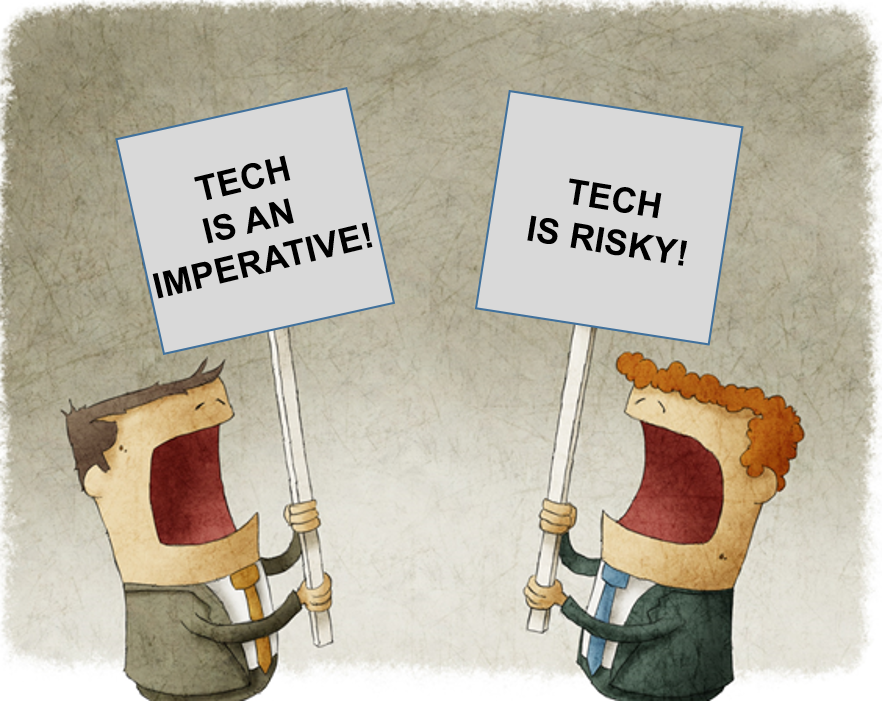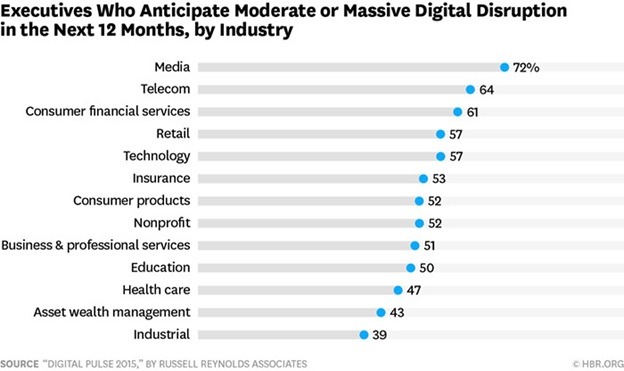
The radio business is not alone when it comes to disruption. And to survive the buffeting changes in our culture, author and CEO Clara Shih argues, “Today, every company has to become a social business.”
Let’s backtrack a bit, and talk about how radio ended up in this place, and then discuss the road back. It starts with an annual survey by Russell Reynolds Associates ranking the verticals where executives expect moderate-to-massive disruption over the coming year. It’s notable that with 2,000 corporate honchos weighing, “media” sits decisively and uncomfortably at the top of the heap. And that puts it ahead of industries that include healthcare, telecom, and yes, even technology.
Why is traditional media like TV, radio, and print so “disruptable?” The Russell Reynolds team explains:
“The most disrupted industries typically suffer from a perfect storm of two forces. First, low barriers to entry into these sectors lead to more agile competition. Secondly, they have large legacy business models which often generate the majority of their revenue. These organizations, therefore, have embedded cultural and organizational challenges when it comes to changing at the pace required.”
If that statement has a ring of truth to radio veterans, then you can understand how “media” outdistances every other category. In fact, more than seven in ten of these corporate respondents believe that it’s #1 on the “Disruption 13” list, well ahead of the other industry silos. That’s because anyone can start a streaming radio station or a podcast, as well as launch programming on mobile apps and other outlets. And the traditional financial model of the radio business – relying on spot sales as the revenue foundation – creates baked in, systemic barriers that make it difficult to adjust on the fly.

So if you’re feeling “the bends,” the shockwaves, and the turbulence at your radio station and in your corporate meetings, it’s to be expected.
So how do we overcome this condition? Looking back over the past two decades, we have watched radio evolve, but not always welcoming new technology. But as time has marched on, all broadcasters have jumped on board, some more reluctantly than others. And as Shih tells The Wall Street Journal, “most companies are doing something and they acknowledge that technology and digital are important – but it’s all about execution.”

And in that context, she says the bar has been raised. Just having social media accounts does not make your radio station a social brand or business.
Shih says the true variable – the characteristic that separates companies that have truly made the leap into acknowledging and embracing the digital reality – starts at the very top.
“Unless CEOs personally take ownership for digital and innovation, it’s not going to happen, because there’s going to be an impasse with the people that want to go forward and the people that don’t.”
To a great degree, that internal schism is at the heart of why so many newspapers have struggled to transform themselves because these different factions exist in newsrooms and corner offices all over the country.
To Shih, it comes down to the people “who view technology and innovation as imperative. But there are also a lot of people whose job it is to minimize risk.” That internal struggle is something that many traditional media outlets continue to experience, even in 2016. And it’s the CEO who can break the tie, lend clarity and focus to the conversation, and make it clear to the rank and file that digital and social don’t just matter – they’re an imperative.
Sometimes company change can successfully take place at the boardroom level. Shih sits on the board at Starbucks and says just the presence of a digitally minded board member can change the atmosphere in the room. However it happens, the data –- consumer usage and revenue generation –- continue to support the wave of digital and social change that has rocked the world of radio, and yet, the industry continues to show it can be resilient and innovative.
So change starts in the C-suite and works its way down to the station level. But what about revenue, and the ways in which digital have changed the rules? Tomorrow, Paul Jacobs addresses the digital adoption dilemma, from his usual sales perspective. Get out your spreadsheets!
Thanks to fellow blogger and friend, Dick Taylor, for the inspiration.
- Why “Dance With Those Who Brung You” Should Be Radio’s Operating Philosophy In 2025 - April 29, 2025
- The Exponential Value of Nurturing Radio Superfans - April 28, 2025
- What To Do If Your Radio Station Goes Through A Midlife Crisis - April 25, 2025




Thank You Fred.
Look forward to seeing you Atlantic City.
Right back at you. Thanks for the intellectual inspiration, as always.
This is one of, if not my favorite, post that you have written. It is a mission statement for our industry.
Thanks for the lighting the path Fred.
Much appreciated, Sean. The story and Clara Shih’s opinions resonated with me and reminded me so much if the radio biz. Thanks for reading our blog.